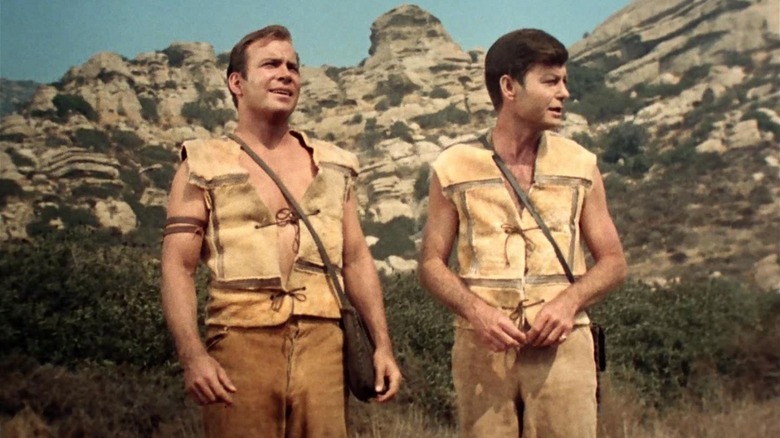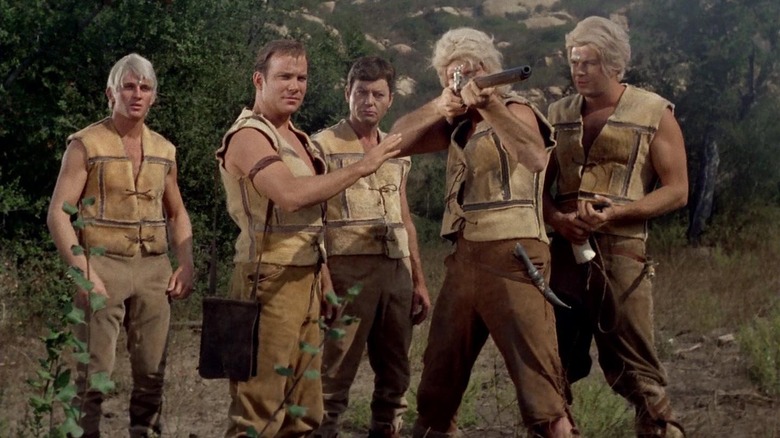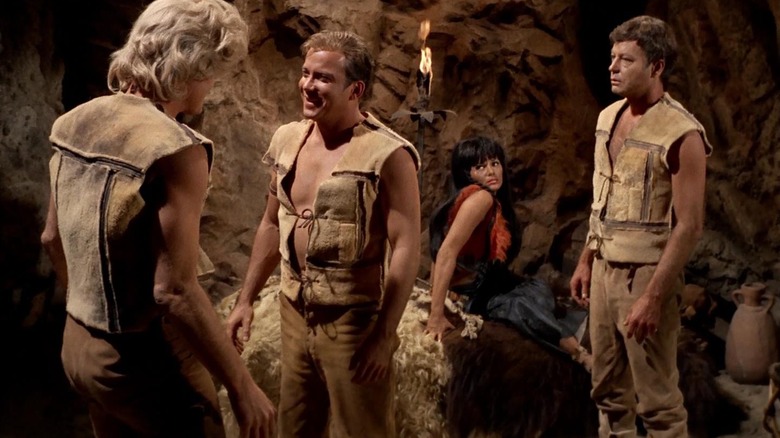How A Pile Of Old Sheepskins Saved Star Trek's A Private Little War
In the "Star Trek" episode "A Private Little War," Captain Kirk (William Shatner) finds himself in the middle of an ethical conundrum. The primitive, agrarian society on the planet Neural, ordinarily peaceful and gentle, has suddenly been granted access to rifles, a technology far ahead of their capabilities. It seems that an evil Klingon named Krell (Ned Romero) has been arming half of the Neural citizens, hoping to perpetuate a vicious civil war. Kirk's initial instinct is to arm the losing side with the same weapons, although others point out that doing so would merely escalate the conflict, not end it. Kirk argues that the losing side would, with weapons, at least be given a fighting chance.
This is, of course, a heavy-handed, Roddenberrian deconstruction of the Vietnam War, which was happening contemporaneously. In "Trek" creator Gene Roddenberry's eyes, Americans were interfering in a civil war they had no vested interest in.
What happens at the end of "A Private Little War" can be debated. Kirk gives an order to distribute rifles to the Neurals, but then seems to have second thoughts. It's unclear if he actually gave the order or not. Was the ending a moment of Kirk doing something he knew to be unethical, or was it a moment when he washed his hands, refusing to be complicit? Either solution is not cozy.
The Neurals were, by the episode's script's description, meant to be dressed like cavemen, wearing skins and other primitive clothing. As revealed in the book "Captains' Logs: The Unauthorized Complete Star Trek Voyages," however, getting together dozens of caveman outfits proved to be prohibitively expensive. But luckily, thanks to the resourcefulness of costume designer Bill Theiss, outfits were cobbled together at the last minute ... out of off-the-rack sheepskin jackets.
'We discovered that costuming them would cost a fortune'
Longtime "Star Trek" director Marc Daniels, who helmed 15 episodes of the original series, recalled in "Captains' Logs" that "A Private Little War," like many "Trek" outings, pushed up against the edges of its budget. Notably, he recalled the jacket incident with clarity, saying:
"I remember that episode also provided a problem in terms of wardrobe. The people on this planet were supposed to be dressed in prehistoric clothing, and we discovered that costuming them would cost a fortune. Bill Theiss, who was always adept at handling such crises, bought a bunch of cheap sheepskin jackets, cut off the sleeves and turned them inside out. We were always trying to work around things like that because of budgetary limitations."
Anyone with hippie parents — parents who were teens in the late 1960s — likely recalls seeing similar sheepskin jackets in their parents' childhood closets. Lightweight sheepskin was common youth wear in the late 1960s, and Bill Theiss could likely have merely walked a few blocks away from CBS Studios' wardrobe building and purchased a pile of them on any random afternoon. The ultimate look of the Neurals is earthy and primitive, and weirdly convincing as the uniform of an agrarian society.
Naturally, actress Nancy Kovack, who played the Neural healer Nona, wore tight pleather pants and a fuzzy tube top, leaving her midriff bare. That's old-fashioned Roddenberrian sexism at its plainest.
The politics of 'A Private Little War'
As mentioned, "A Private Little War" has long been seen as a metaphor for the Vietnam War, even if it is a little clumsy. It seems that the episode's original writer, Don Ingalls (using the screen name of "Jud Crucis"), didn't originally conceive a war allegory. He said in an issue of Starlog Magazine, quoted in "Captains' Logs," that his story was just an action/adventure story:
"Mine was more of an adventure in a vacuum; Gene's was more a political statement. His story was more tilted to parallel Vietnam than I did."
Roddenberry was ambitious and also notoriously a control freak; one can find many stories about how often Roddenberry wrested control — and sometimes royalties — from his writers. However progressive Roddenberry may have been in certain regards, he often tilted toward absolute authority when it came to "Star Trek."
The problem is Roddenberry's rewrites confuse the politics of the day. Was "A Private Little War" means to be a liberal peace allegory, or a conservative, pro-war allegory? Even actor Walter Koenig was confused, and was also quoted in "Captains' Logs," saying of the episode's politics:
"That was the one episode that I thought digressed from a rather liberal, political posture. I had a very strong feeling about it. I thought that in maintaining this balance of power we were justifying the building of armaments. It was just like the Cold War to a point."
If that's the case, "A Private Little War" is an outlier in "Star Trek," a show that more typically devotes its thoughts to diplomacy and pacifism.
At the very least, the sheepskin jackets looked cool.


